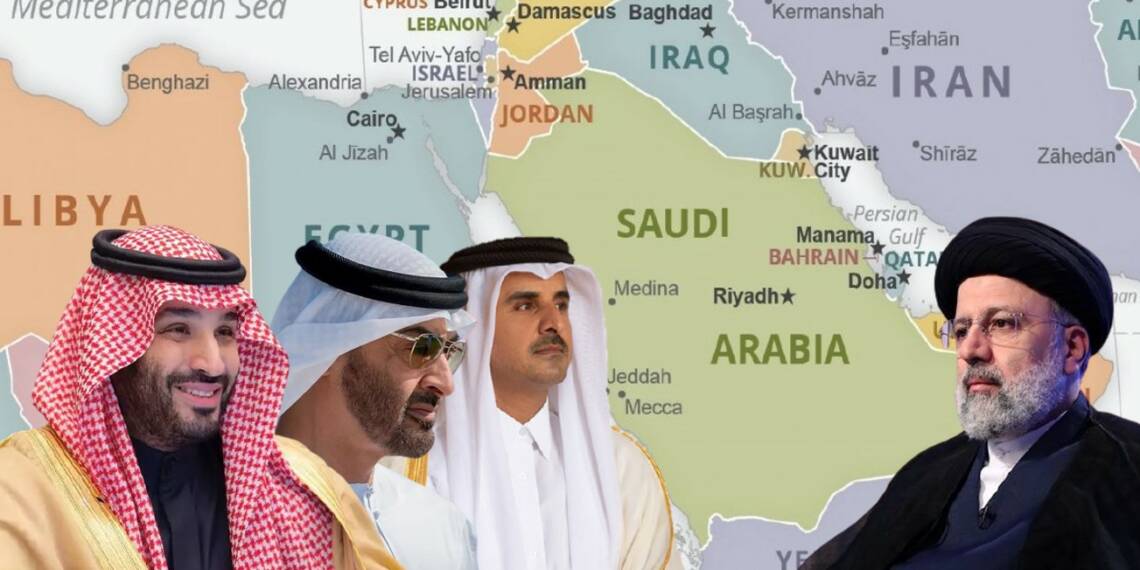On Sunday, the Saudi-led coalition accused Iran and Hezbollah of assisting Yemen’s Houthi rebels in firing missiles and drones at Saudi Arabia, killing two people. Saudi Arabia has accused Iran of supplying the Houthis with weapons and Hezbollah of training the insurgents since the alliance entered over seven years ago to assist Yemen’s government. Tehran refutes the allegations. Hezbollah, a Shiite militant group in Lebanon backed by Iran, has consistently denied sending fighters or weapons to Yemen.
The latest Saudi charge came as the coalition ramped up its aerial bombing campaign against the Houthis, who are backed by Iran, in revenge for the kingdom’s fatal attacks. However, this is not the whole story, if one looks at the overall situation from the birds-eye view, these statements come after a United Arab Front has mobilised to make sure that Iranian proxies are no longer effective in the larger Middle East. Right from Qatar’s rapprochement with the UAE, Saudi Arabia and Israel, depletion of Iranian influence in Iraq as well as Hezbollah’s political rout in Lebanon.
Iran’s retreat from the Middle Eastern geopolitics
Iran has been trying to capitalise on any and every rupture to increase its influence via proxies. In the process, Iranian proxies end up destabilising the region, compromising the existing political system and in the larger context keep the region away from a sustainable economic path towards common prosperity. However, with the UAE and Egypt on a diplomatic winning streak and Saudi Arabia in consonance with the actions of these countries, the heydays of Iranian proxy ops are over.
- UAE’s offensive against Iran via Ankara: Under the guidance of the UAE, Ankara is now making changes in its approach towards foreign policy and improving ties with Israel and Egypt. Erdogan stated that he is willing to establish a comprehensive dialogue with Israel. UAE has found the best tool in Turkey to highlight the Iranian destabilising activities and use it to launch a geopolitical offensive against Iran. As Ankara is forced to remove its support for opposing sides in Syria, Libya among other places, the arithmetic will shift in the favour of the larger Arab allies and away from Iran.
- Qatar’s homecoming: Several high-profile visits have taken place in Doha over the past month. Saudi Arabia’s de facto ruler Mohammed bin Salman visited Doha earlier this month. Not long ago, the idea of MBS visiting Qatar was simply unthinkable. The Arab world would like to have Qatar on its side to exert maximum pressure on Iran to give up its nuclear dreams. Hence, Qatar has suddenly emerged as a top foreign policy priority for the Saudi bloc and the way in which it is reciprocating tells the obvious story of Qatar’s homecoming.
- Iraq turns towards the Arab world: Iran has made many reckless and irresponsible moves, such as attempting to create a civil war-like situation and then going ahead with an attempted assassination of Iraq’s Prime Minister. According to Anadolu News Agency, Iraq’s Sadrist Movement aspires to build a national majority administration, according to its head, after dominating the country’s legislative elections as the Sairoon Alliance last month. Muqtada Al-Sadr, a Shia cleric, declared at a press conference in Najaf, southern Iraq, that uncontrolled armed groups like the Iran-backed Hashd Al-Shaabi militia should be dissolved and their weapons handed over to the government. If anything, this call by a significant Shia cleric tells the reality of Iraq, where Tehran has lost the support of Shias, while Saudi Arabia and other Arab allies gain influence.
- Iranian proxy Hezbollah losing support in Lebanon: The UAE, Egypt and other Arab countries are trying to bring back Syria in the Arab League and things are going in the right direction. And as the efforts of these nations in cooperation with Israel bear fruits, the significance and impact of Hezbollah as an Iranian terror proxy has touched an all-time low. This is easily visible from the situation of Hezbollah in Lebanon. Lebanon’s top Christian party has indicated it is considering ending a political alliance with Iran-backed Hezbollah, threatening a fragile union that has shaped Lebanese politics for nearly 16 years.
Also Read: UAE’s Crown Prince Bin Zayed is fast turning into the real leader of the Middle East
In addition to these developments, Egypt too is playing its part. Not only is the country working with Israel and Palestinian Authorities to remove Hamas from the Gaza strip, but it is also working with Lebanon and Syria to establish a pipeline to secure Lebanon’s energy needs.
In the background of all these developments, Coalition spokesman Turki al-Malki told a news conference the Houthis were “militarizing” Sanaa airport and using it as a “main center for launching ballistic missiles and drones” towards the kingdom. Malki gave reporters a video clip depicting “the headquarters of Iranian and Hezbollah experts at the airport,” where “Hezbollah is instructing the Houthis to booby-trap and operate drones,” according to Malki. Malki also revealed recordings of a Hezbollah member installing explosives in a drone and a guy he identified as a Hezbollah official instructing Houthi fighters, “We must strengthen our ranks,” according to Malki.
Also read: With its massive Turkish coup, UAE is officially leading the war on Iran
These statements and proofs are all the more significant as the Saudi-led coalition is making them from a position of power, and they know that. Saudi Arabia, UAE, and Egypt along with Israel and other regional allies are making the Arab world come together and mellowing down the differences. This is being done while simultaneously decimating Iranian proxies and their operations.








